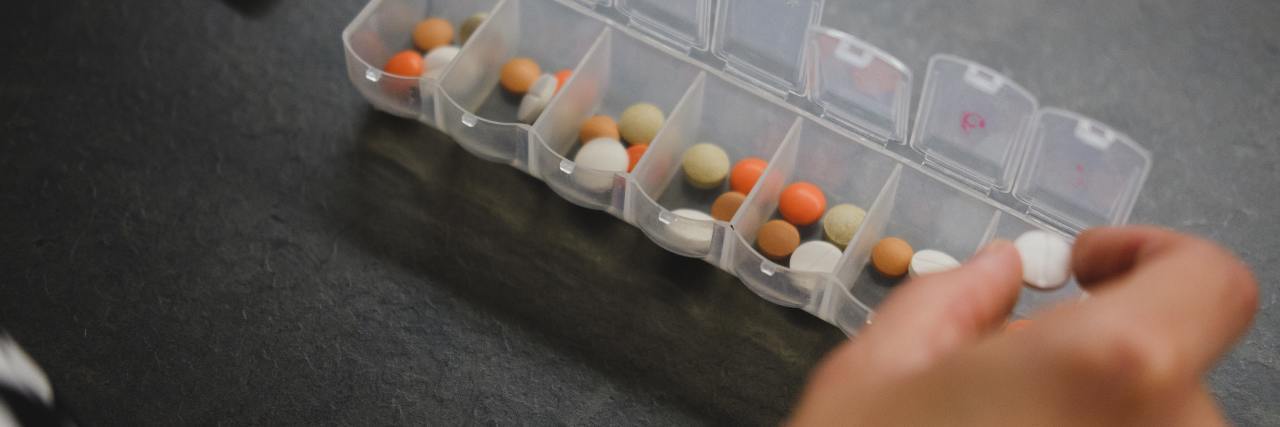Please Don't Let Anyone 'Pill Shame' You If You Need Anxiety Meds During COVID-19
Editor's Note
Join The Mighty’s Coronavirus group to connect with other Mighties living through the pandemic. Read the latest updates, share helpful tips, or give and receive virtual support.
Most of us, if not all, have experienced anxiety. It’s that feeling you’d get if your car broke down in a deserted road in the middle of the night and you were alone without a cell phone signal. Increased heart rate, shaking, sweating, stomach and intestinal discomfort, increased breathing rate, sense of impending doom, nervousness and restlessness are some of the most common symptoms of anxiety.
Unsurprisingly, during the coronavirus (COVID-19) pandemic, our anxiety levels world-wide have risen dramatically. According to recent report from Express Scripts, a pharmacy benefit manager, we have also seen a 34% increase in prescriptions for anxiety medication.
If you have had to go on anxiety medication during the pandemic, I want you to know you’re not alone. Unfortunately, when it comes to mental health medication, there’s still a lot of stigma. Despite what others might say, there is no shame in taking anxiety medication. As Mighty contributor Cherie Davies wrote in her article, “Please Stop ‘Pill Shaming’ People With Anxiety and Depression“:
There is no shame in accepting the assistance of medication. It doesn’t make you any less human, it doesn’t make you weak or any less capable of doing the job, writing the essay or completing the degree — the same way a person without a mental illness would.
In times of COVID-19, there are many reasons to be anxious. Aside from the worry of the infection itself, there are a myriad of situations that threaten our mental balance. Issues such as income and work decreasing, social distancing and quarantining, uncertainty and having to adapt too quickly to changing situations (both globally and personally).
If you’re starting (or restarting) anxiety medication during the pandemic, here are a few tips that can help you as you adjust:
1. Be informed.
There are a few different types of medication that are generally used to treat anxiety symptoms. Some of the most common are benzodiazepines and antidepressants. It’s a good idea to ask your doctor what you can expect to feel, what side effects you should look out for, if alcohol/other medications will interact with the anxiety med and any other question that will help you understand the effect of the medical treatment in your body and your mind.
2. Communicate with your doctor openly.
Everybody reacts differently to medication. That is why there are so many types of medication for the same diagnosis. It’s also worth noting that everyone experiences the same diagnosis in different ways. It’s crucial to give your doctor feedback of anything unexpected, any side effects or if you feel the medication is not working for you or making you feel worse. Don’t feel ashamed or reluctant because you don’t want to be a burden. In order for the doctor to know if it’s working, your feedback is key.
3. Be consistent.
It’s important to follow the dosage instructions that were prescribed to you. Failing to take a dose or taking too much of it can be dangerous. If you are noticing you’re feeling better, you might be tempted to stop the treatment. Consider that you might be feeling better because of the medication and not because you don’t need it anymore. Some of these medicines have uncomfortable withdrawal symptoms and skipping doses will most likely bring on these symptoms. If you think you should tweak your doses, talk about it with your doctor and make out a plan with them.
4. Remember you’re not alone.
Looking at a picture or video or spending a couple of hours a day with someone will not tell you that the person you’re looking at has a good mental health. Many people struggle silently and masquerade their symptoms pretty well through functionality and smiles. I promise you, there is not one human being in the world who doesn’t have a hard time sometimes. We cry, we get angry, worried, sad. We get irritable, we dislike ourselves sometimes, this is being human. Nobody escapes emotions that make us feel bad. So, don’t ever feel alone or singled out. Nobody has a perfect life, nobody has the same story and nobody can judge.
If you notice someone is having a hard time, be there. Not physically, obviously, but message them, call them, check in with them. Empathy is one of the most powerful tools we have as human beings and we don’t have to be mental health professionals to provide it. So, be that one person who listens without judging, who reminds others of their value; be the difference.
Concerned about coronavirus? Stay safe using the tips from these articles:
Unsplash photo via Laurynas Mereckas

